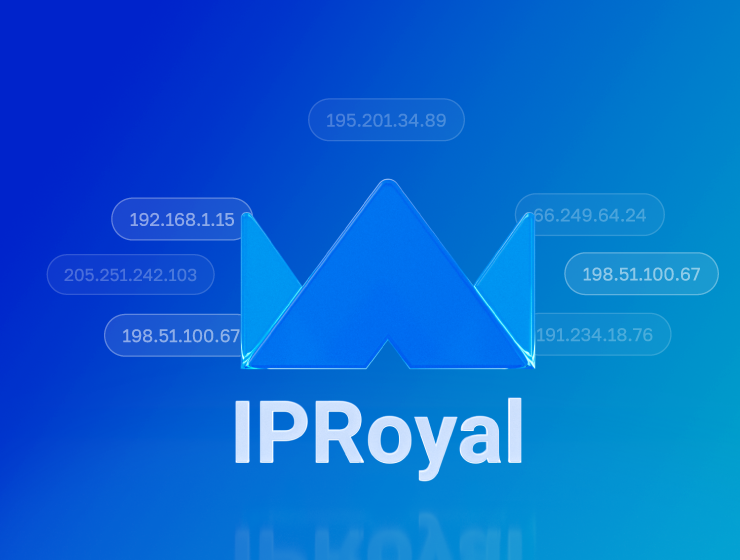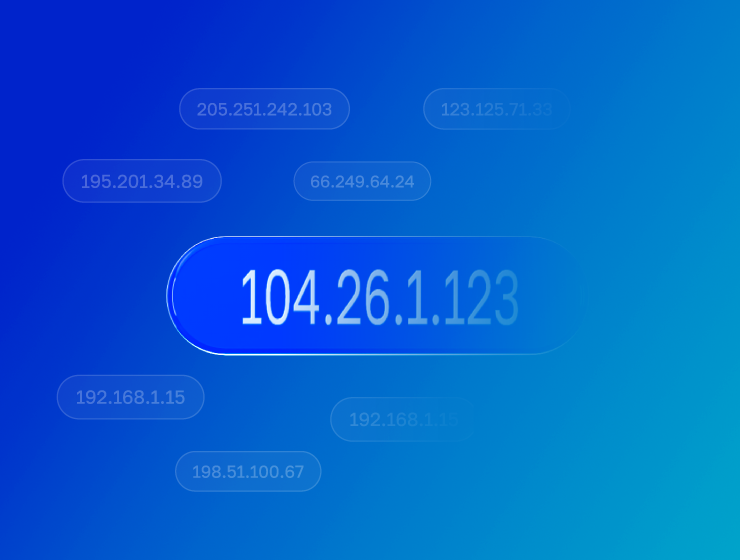What are proxies for bookmakers and why do you need them
Bookmaker proxies work like a relay point. You send a request, it goes to the proxy server, and from there it’s forwarded to the bookmaker’s website. The response comes back the same way. The bookmaker only sees the proxy server’s IP, while your real address stays hidden.
Why would bettors even bother with proxies for bookmakers? Plenty of reasons. Some want to access Pinnacle from Russia, where it’s been blocked since 2014. Others are hunting arbitrage across five different bookies, running 3–4 accounts in each. Then you’ve got people farming welcome bonuses — they register, clear the wagering requirements, cash out profit, and move on to the next bookie with a fresh IP.
Modern bookmakers spend millions on security systems. Algorithms track everything: where you’re logging in from, how often you change IPs, whether your betting patterns overlap with other accounts. If they catch you multi-accounting, they’ll slash your limits down to $10. Or worse — they’ll freeze withdrawals until you send them a video holding your passport. Properly set up betting proxies help you stay under the radar.
Contents
- What an Anonymous Proxy Service Represents
- How an Anonymous Proxy Works
- Proxy Anonymity Levels
- Types of Anonymous Proxies
- Main Benefits of Using Anonymous Proxies
- Risks and Limitations
- How to Set Up and Use an Anonymous Proxy
- Solving the "Anonymous Proxy Detected" Error
- How to Choose a Reliable Anonymous Proxy Service
- FAQ
- Conclusion
- VPN and Proxy: Key Differences
- What is a Proxy Server?
- What is VPN?
- Security and Privacy
- Speed and Performance
- When Should You Use a Proxy Server?
- When Should You Use VPN?
- Is It Worth Using VPN and Proxy Together?
- Mistakes When Choosing Between VPN and Proxy
- Busting Myths About VPN and Proxy
- VPN or Proxy: How to Choose the Right Option?
- FAQ
- Conclusion
- What is a proxy server for Google Chrome and why do you need it
- How proxy works in Chrome browser
- Ways to configure proxy in Google Chrome
- Setting up proxy in Google Chrome through Windows
- Setting up proxy in Google Chrome through macOS
- Setting up proxy for Chrome through extensions
- Setting up proxy in Chrome on Android
- Setting up proxy in Chrome on iPhone and iPad
- Connection check and speed test
- Typical errors when working with proxy in Chrome
- FAQ
- Conclusion
- Why you need proxies for Reddit
- Why Reddit might be blocked
- What restrictions does Reddit have
- Who needs proxies and how they help
- What you can do with proxies for Reddit
- How to choose the right type of proxy for Reddit
- Proxy vs VPN for Reddit
- How to set up and use proxies for Reddit
- Top proxy providers for Reddit in 2025
- Common problems and solutions
- Practical use case scenarios
- FAQ
- Conclusion
- Why LinkedIn requires using proxies
- How proxies help in working with LinkedIn tools
- Types of proxies for LinkedIn and selection criteria
- 10 best proxy providers for LinkedIn
- Setting up and using proxies
- Tips for safe LinkedIn outreach scaling
- FAQ
- Conclusion: how to build a stable system for working with LinkedIn through proxies
- How Amazon detects and blocks proxies
- Benefits of using proxies for Amazon
- Which proxy types work best for Amazon
- Best residential proxy providers for Amazon (2025)
- Key features of a good Amazon proxy provider
- How to set up a proxy for Amazon
- Common problems when working with proxies on Amazon
- How to use Amazon proxies for different tasks
- Best practices for safe Amazon proxy usage
- FAQ
- Conclusion – choose stability, not quantity
- Step 1 — Download and Install VMLogin
- Step 2 — Create a New Browser Profile
- Step 3 — Get Your Gonzo Proxy Credentials
- Step 4 — Configure Proxy Settings in VMLogin
- Step 5 — Verify Proxy Connection
- Step 6 — Launch Your Browser Profile
- Step 7 — Optional: Set Up Multiple Profiles / Rotating Sessions
- Step 8 — Troubleshooting Common Issues
- Step 9 — Start Automating with Gonzo Proxy + VMLogin
- What is an anonymizer in simple terms
- How anonymizers differ from proxies and VPNs
- How an anonymizer works
- Types of anonymizers and anonymity levels
- How to format proxies for working with anonymizers
- How to use an anonymizer to access blocked sites
- Advantages and risks of using anonymizers
- How to choose an anonymizer or proxy for your tasks
- FAQ
- Conclusion
- How to sell quickly and effectively on Avito
- What is mass posting on Avito and why you need it
- Manual and automated mass posting
- Multi-accounting: how to manage multiple accounts on Avito
- Step-by-step launch plan
- How not to get banned with mass posting and multi-accounting
- Mass posting vs alternative sales methods
- FAQ
- Conclusion
- Why TikTok gets blocked and doesn't always work with VPN
- How proxies and VPN differ for TikTok
- When it's better to choose VPN for TikTok
- When it's better to choose proxy for TikTok
- How to set up proxy for TikTok (short instruction)
- Risks and precautions when working with TikTok through VPN and proxies
- FAQ
- Conclusion
- What does transparent proxy mean
- How transparent proxy works in a real network
- Spheres of application for "invisible" proxy
- Advantages and disadvantages of transparent proxy
- Setting up transparent proxy: step by step
- Are transparent proxies secure
- Popular solutions for transparent proxy setup
- Checklist for working with transparent proxies
- FAQ
- Conclusion
- Why proxies are a must for Dolphin Anty
- Types of proxies you can connect to Dolphin
- Rotating vs Static
- Step-by-Step: How to Add a Proxy in Dolphin Anty
- Common proxy connection errors and fixes
- How to choose reliable proxies for Dolphin Anty
- Tips for optimizing costs
- Practical cases of using Dolphin Anty with proxies
- FAQ
- Final thoughts
- Types of proxies used for parsing
- How to choose proxies for parsing
- Setting up and rotating proxies for parsing
- Technical tricks for bypassing blocks
- Practice: building a proxy pool for parsing
- Metrics and monitoring parsing quality
- Best practices and ready solutions
- FAQ
- Summary: Which proxy to choose for parsing
- How proxies work in traffic arbitrage
- Types of proxies for arbitrage and their features
- What problems do proxies solve in arbitrage
- Top proxy providers for arbitrage in 2025
- Comparison table of proxy providers
- How to pick the right proxies for arbitrage
- How to set up proxies for arbitrage
- Safe proxy usage tips
- FAQ
- Conclusion
- What are residential proxies needed for?
- How do residential proxies work?
- How do residential proxies differ from others?
- Connecting residential proxies from GonzoProxy
- Examples of using GonzoProxy residential proxies in Python
- Pros and cons of residential proxies
- How to check residential proxies
- Common usage errors
- FAQ
- Conclusion
- Why does Facebook often block accounts and cards?
- Why use a virtual card for Facebook Ads?
- Multicards.io — a trusted virtual card service for Meta Ads
- Should you buy or create Facebook ad accounts?
- Why proxies are essential
- What kind of proxies are best for Facebook Ads?
- GonzoProxy — premium residential proxies for Facebook Ads
- How to safely link a virtual card to Facebook Ads
- Final recommendations
- What’s a DePIN farm and why should you care?
- So, what exactly is DePIN?
- Other DePIN projects already killing it
- What do you need to start your DePIN farm?
- How to create profiles and set up the antidetect browser
- How to choose and set up a proxy?
- What about Twitter/X accounts?
- How to get email accounts?
- Before you launch — one last tip!
- How to properly chain your accounts?
- How modern fraud detection systems track violators
- Google Ads: anti-fraud specifics in 2025
- How to tell your proxies aren't working?
- Why most proxies no longer work with ad platforms
- How to select and verify proxies for ad platforms
- Strategy for stable operation with ad platforms
- Conclusion: don't skimp on infrastructure
Technically the scheme is simple: your PC → proxy → bookmaker’s server. You type bet365.com in your browser, but your request first goes to a proxy in London, and from there to the bookmaker’s server. The bookmaker sees a UK IP and assumes you’re a local.
In live betting, every millisecond counts. While your bet on over 2.5 goals is crawling through a proxy, a goal might already have been scored. Odds of 1.85 drop to 1.40, and you won’t even realize why your bet didn’t go through. A good ping for live betting is max 100 ms, ideally 50–70.
Geolocation is another trap. Yesterday you were in Moscow, today in London, tomorrow in Tokyo — any security system will flag that. Some bookies block instantly, others ask for a selfie with your passport. Stick to one region or change locations gradually, with breaks of a few days.
Mobile proxies
Mobile operator IPs raise the least suspicion with bookmakers. Why? Imagine the scale of the problem: blocking Vodafone or T-Mobile subnets means cutting off thousands of legit customers who just installed the bookmaker’s app. That’s business suicide. Plus, mobile operators constantly shuffle IPs between users. At 9 AM some guy broke the rules on IP 37.140.192.x, but by 6 PM that same IP is assigned to a retiree downloading the bookmaker app for the first time. Blocking those IPs makes no sense — tomorrow they’ll belong to innocent people.
Want to run 15 accounts in the same bookie? With mobile proxies it’s doable. Each account sits on a separate mobile IP from a different city. To the bookmaker’s security system, that looks like 15 unrelated people using smartphones. Anti-fraud filters are set to be lenient on mobile traffic — otherwise, they’d be banning half their real customers.
The obvious downside? Price. Decent mobile proxies start at $35–40/month each. Need 10 of them? Multiply it out. That’s more than rent for a small apartment.
Residential proxies
Residential proxies come from home networks — IPs of ISPs like Comcast, Virgin Media, Rostelecom, Beeline, and hundreds more. When you log in via one, the bookmaker sees just a regular person sitting at home with a laptop. No proxy signatures, just a clean home IP with browsing history on YouTube, Facebook, and online shops. Where do these IPs come from? People install special apps that rent out a slice of their connection for money. Win-win: the device owner gets passive income, and you get a real home IP.
These proxies are the golden middle ground for long-term accounts. Trust level is high — not quite as much as mobile, but close. And they’re way cheaper: $2–4/GB versus $35–40 for mobile. Each active account uses about 5–10 GB a month, so $20–40 total instead of hundreds. The only downside: speed can be inconsistent. If the proxy comes from someone with slow internet, you’ll be loading pages in 3–5 seconds. Fine for casual betting, but a disaster for live arbitrage.
Datacenter proxies
Server proxies are based in datacenters with gigabit channels and direct backbone connections. Ping to European bookies can be as low as 5–30 ms — 10 times faster than regular home internet. Pages load instantly, bets go through in fractions of a second. Compared to residential, while you’re still loading the betting line, with datacenter you’d already have placed three bets. Speed shines on fast markets — corners in live football, tennis games, esports rounds. And the price is great: $1–3 per IP per month. For the cost of one mobile proxy you can rent 20–30 datacenter IPs.
Bots and scripts love datacenter proxies for their speed and uptime. No drops, 99.9% stability, always consistent. Set your arbitrage bot running and let it go nonstop. But there’s a huge catch: bookmakers spot datacenter IPs instantly. Public databases list all datacenters worldwide. Their security system checks your IP, sees it’s from Amazon or Hetzner, and flags you immediately. Some bookies slash limits at registration, others let you play a few days then ban. Only use datacenter proxies for technical tasks where losing the account doesn’t matter — testing strategies, scraping odds, line parsing.
Public and private proxies
Free betting proxies are easy to find — just Google “free proxy list” and you’ll see thousands. But they’re useless. One in ten even works, speeds are dial-up level, and the IPs are already blacklisted everywhere.
Private proxies are yours alone. Nobody else uses that IP, so the reputation stays clean. That’s the only option for serious betting.
By protocol (IPv4, SOCKS5, HTTP/S)
SOCKS5 is the go-to for pro bettors working with automation. Why? It handles all traffic types — not just web pages but also bots, scrapers, and betting software. Latency is minimal since SOCKS5 doesn’t inspect packet content, just forwards them. That’s a 10–30 ms edge over HTTP. Seems small? In arbitrage, those milliseconds are worth thousands. Plus, SOCKS5 supports UDP traffic, which some bookmaker apps and live streams rely on. With HTTP proxies, they just won’t work.
IPv4 is still the universal standard — every bookmaker supports it. HTTP/HTTPS are easier to set up in browsers — just a couple clicks. But if you’re serious about betting, using bots or automation, forget HTTP. Only SOCKS5. The speed difference will pay off within a week.
Bypassing geo-blocks and restrictions
Betfair doesn’t work in 100+ countries. Bet365’s blocked in Russia since 2016. Smarkets only accepts UK residents. Gambling proxies fix this — just pick the right country and you’re in.
But beware: for big withdrawals, many bookies require ID verification. Logged in through a UK proxy? Be ready to show a UK passport. Without it, you won’t cash out.
Working multiple accounts without bans
Classic mistake: 5 MarathonBet accounts on your home IP. The system sees 5 names on one address = multi-accounting. All banned at once.
With proxies, each account runs on its own IP from different cities. To the bookmaker, they’re separate people. Just don’t mix them up — keep a spreadsheet.
Improving stability and speed
If you’re in Vladivostok betting with a European bookie, your data travels 10,000 km. That’s 400–500 ms latency.
Connect through a proxy in Frankfurt, just a few hundred km away — ping drops to 30–50 ms. Huge difference in live betting.
Reducing risks in live bets
Odds swing wildly in live games. A penalty halves the goal odds instantly. A red card and they spike the other way. With poor connection, you’re always behind.
Good proxies give you a 1–2 second edge. Sounds small? That’s enough to get your bet in while others are still loading.
GonzoProxy
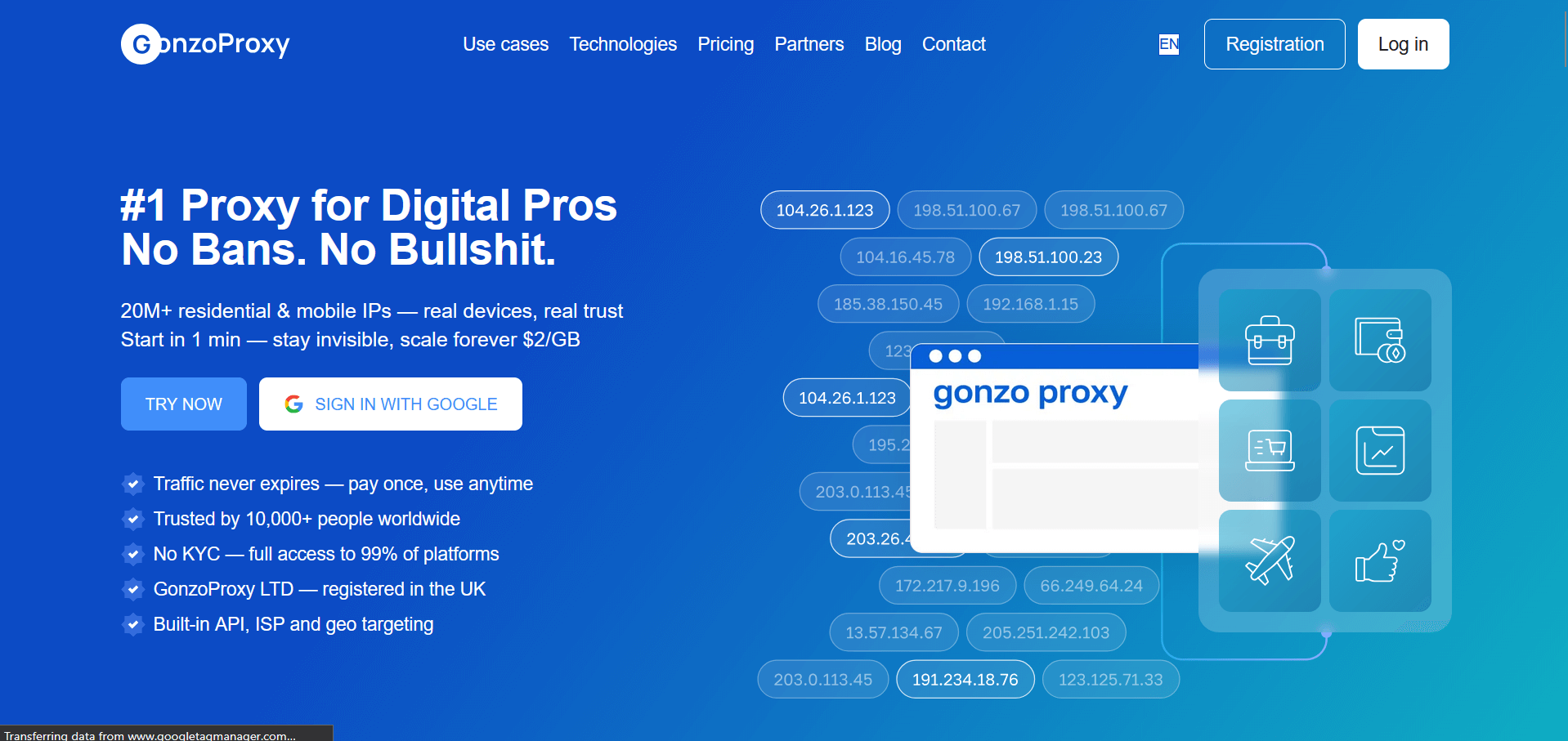
UK company with a P2P network of 20M+ devices. Residential proxies with rollover traffic and unlimited mobile proxies. Traffic never expires — use it anytime. Google sign-up in 30 seconds, no KYC. Telegram support replies in 5 minutes, 24/7. Mobile proxies only in Ukraine and Poland.
Pros:
- Traffic never expires
- Instant sign-up, no documents
- 24/7 Telegram support
- Free city & ISP targeting
Cons:
- Limited geography for mobile
- No free trial
Pricing:
- Residential: $6.5/GB (1–24 GB), $2/GB (5000+ GB)
- Mobile: $45/month unlimited
IPRoyal
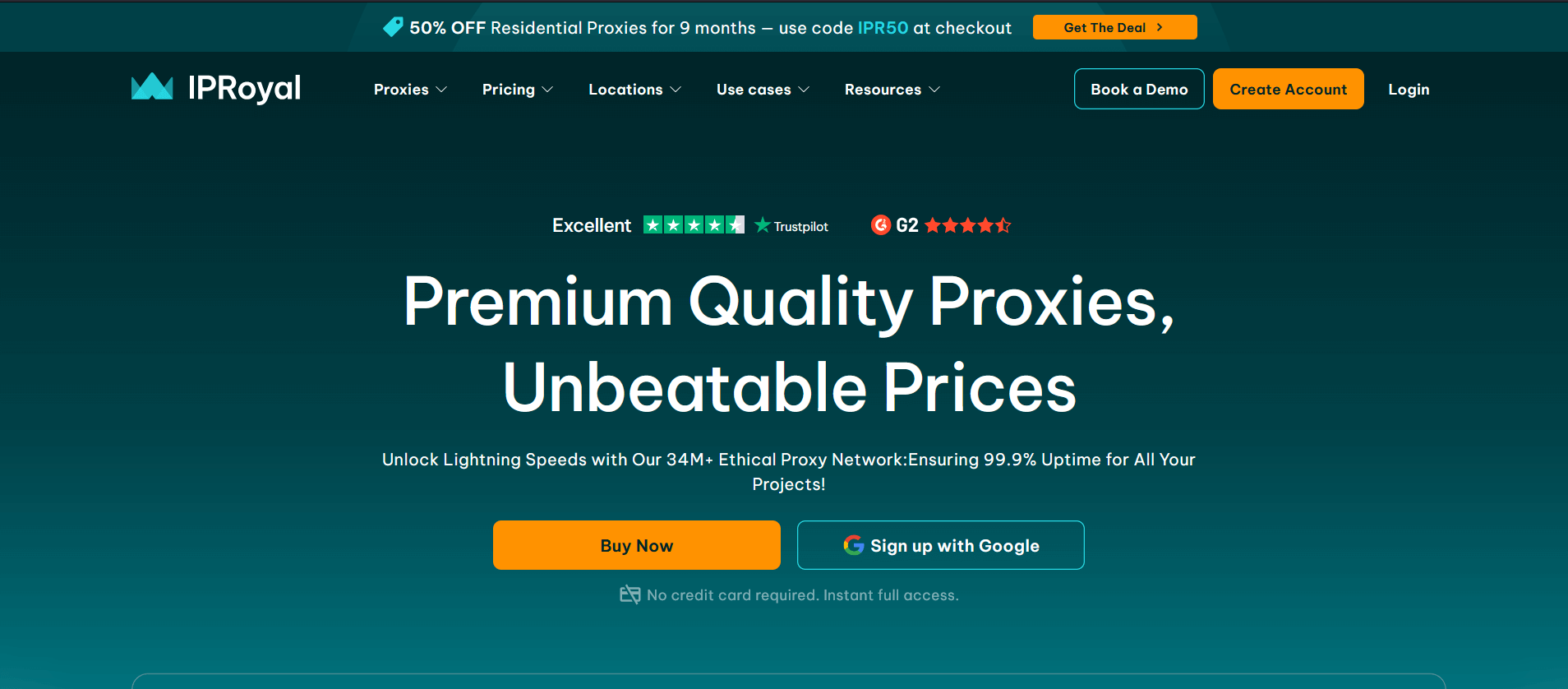
Lithuanian service with 2M+ residential IPs. Uses Pawns app to collect IPs. Offers static residential IPs for long-term accounts. Few mobile proxies, mostly in Europe and CIS. Support only in English, replies within 24 hours.
Pros:
- Static IPs for permanent use
- Detailed traffic stats
- Cheap small packages
Cons:
- Small IP pool
- Slow English-only support
- Limited mobile proxy options
Pricing:
- Residential: from $7/GB
- Static residential: from $2.40/IP per month
- Minimum payment: $20
Smartproxy
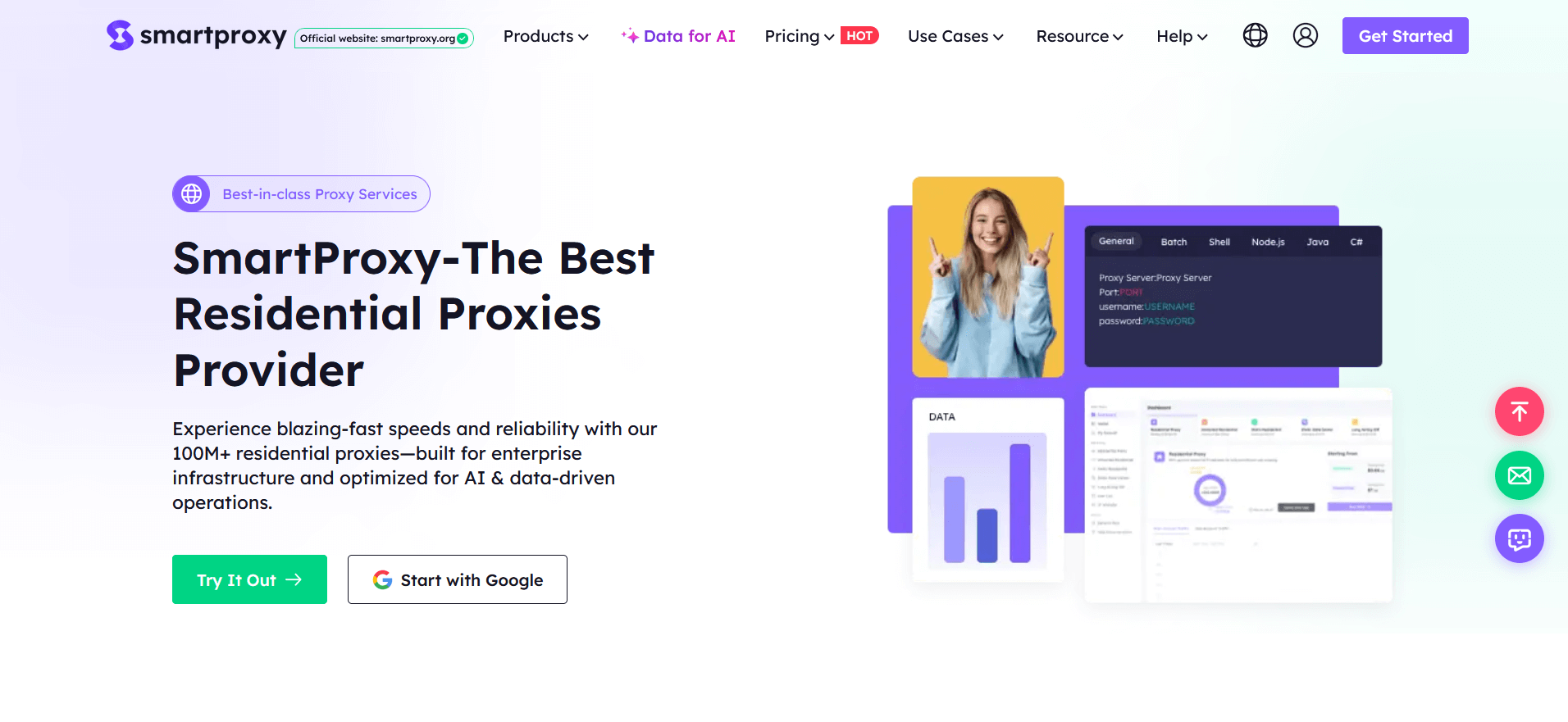
US-based, 40M+ IPs in 195 countries. User-friendly dashboard, browser extension included. Traffic expires in 30 days. Minimum package is 100 GB — too much for testing. Russian IPs often buggy.
Pros:
- Huge global coverage
- Intuitive dashboard
- Browser extension for quick setup
Cons:
- Traffic expires in 30 days
- High entry point (100 GB minimum)
- Russian IPs unreliable
Pricing:
- Residential: $8.5/GB (with 100 GB)
- Datacenter: from $0.7/GB
- Minimum payment: $850
Oxylabs
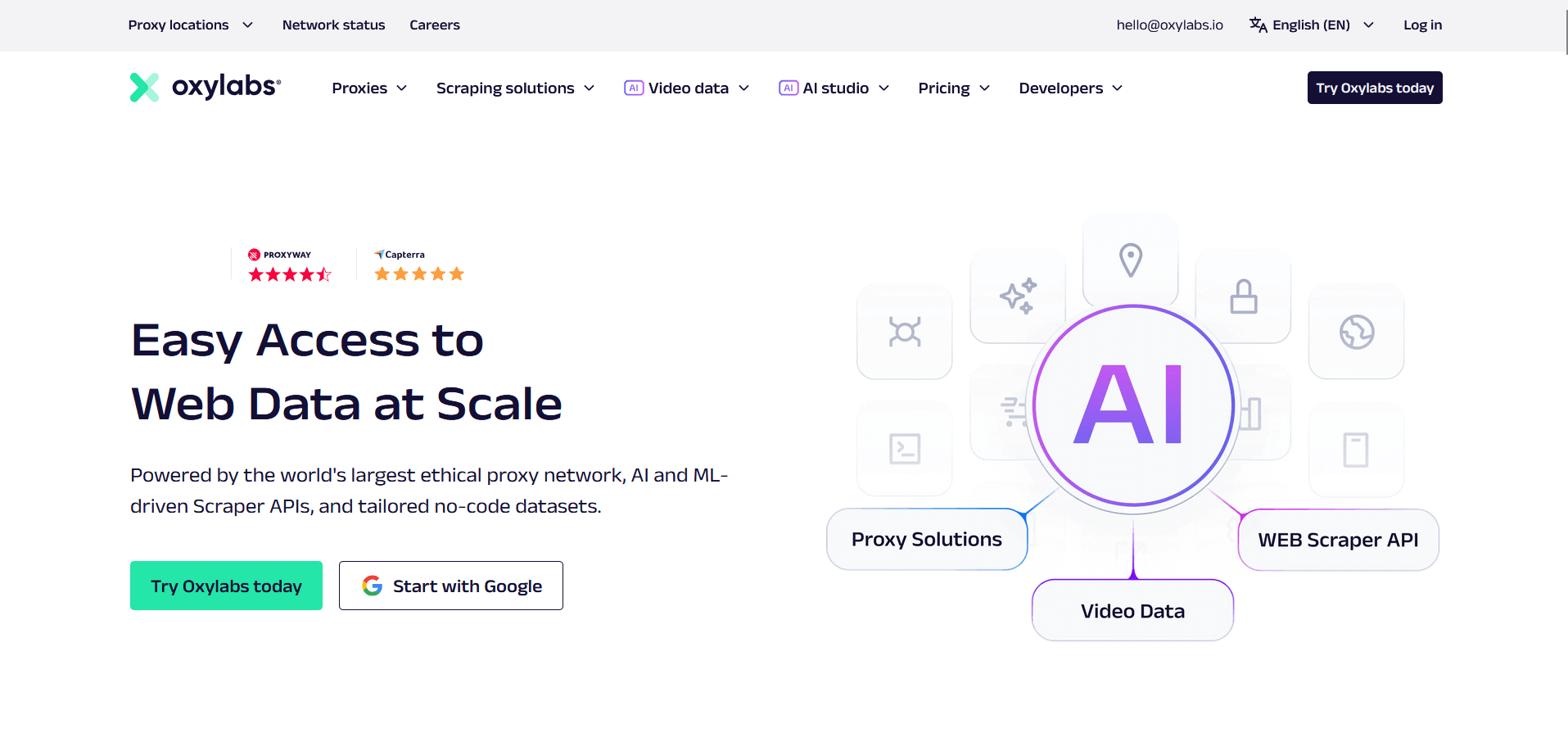
Lithuanian corporate-focused service. 100M+ IPs. Minimum spend is $500/month, so small bettors are cut out. Dedicated account managers for big clients. Too pricey for individuals.
Pros:
- Largest IP pool
- Personal account manager
- Premium quality and stability
Cons:
- Way too expensive for personal use
- Complicated registration
- B2B only focus
Pricing:
- Residential: from $10/GB
- Minimum $500/month
- Enterprise: custom
ProxyEmpire
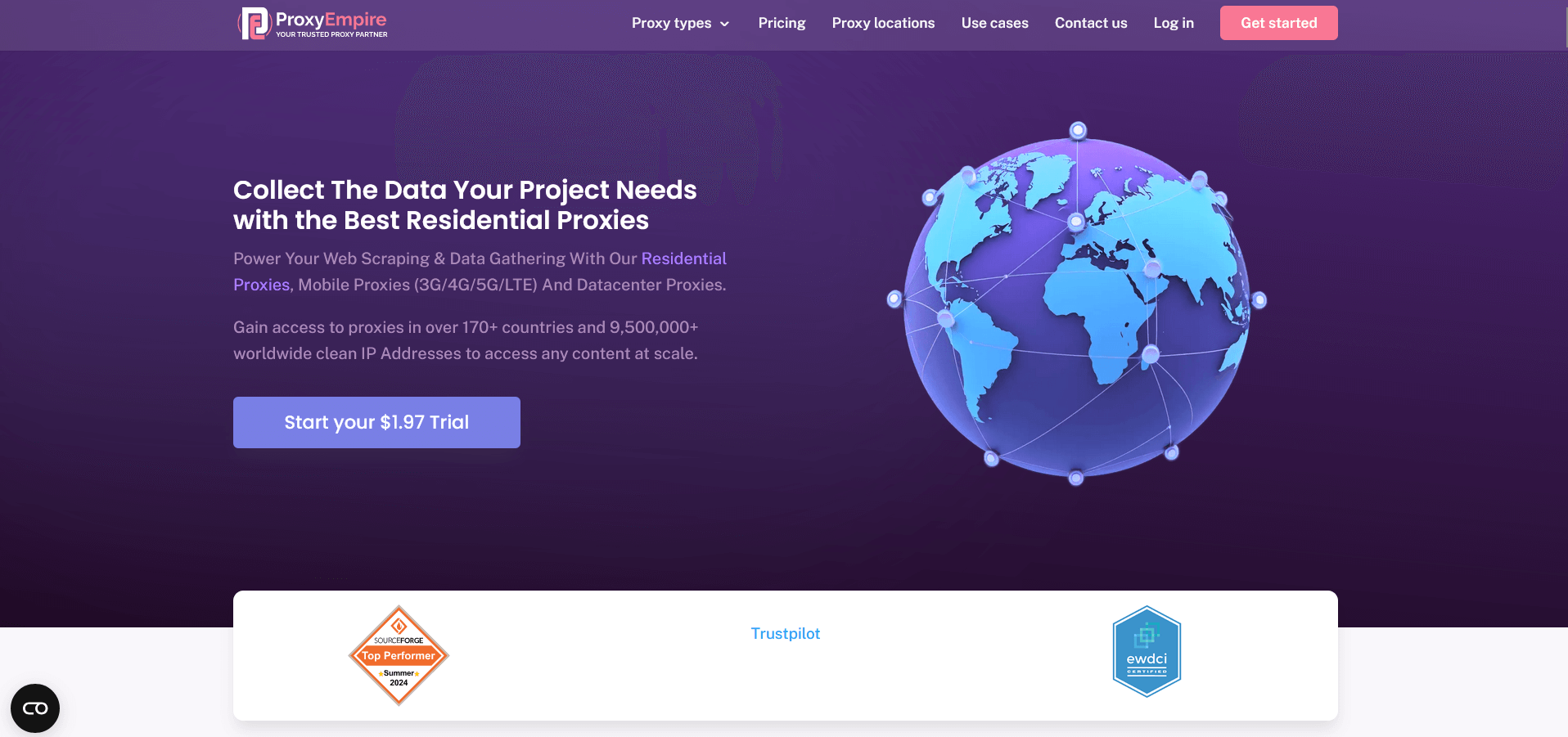
US newcomer since 2021. Focuses on mobile & residential proxies. Rotation by city and ISP available. Still young, few reviews, unproven reliability. Mostly Tier-1 locations.
Pros:
- Flexible rotation settings
- Unlimited connections
- Rollover unused traffic
Cons:
- Young, unproven service
- Limited geography (mainly US/EU)
- Little info on quality
Pricing:
- Residential: from $15/GB
- Mobile: from $30/GB
- Minimum $250
BrightData

Israeli provider, formerly Luminati. 72M+ IPs. Complex pricing with tons of add-ons. KYC required for large volumes. Minimum deposit $500. Dashboard is overloaded, tricky for beginners.
Pros:
- Massive infrastructure & coverage
- Advanced tools for pros
- Maximum speed & stability
Cons:
- Confusing pricing
- Requires verification for volume
- Hard for beginners
Pricing:
- Pay as you go: $500/month min
- Residential: $15/GB + add-ons
- Enterprise: custom
- Geolocation — always match the bookmaker’s region. Bet365 trusts UK IPs, Pinnacle prefers Europe, Asian bookies trust Asian IPs. Don’t use oddball regions like Nigeria or Bangladesh — they’ll raise red flags.
- Proxy type — mobile gives max safety, best for big sums and long-term accounts. Residential is the best price/reliability balance. Datacenter only for testing.
- Speed & stability — live betting needs low ping. <50 ms is perfect, 50–100 ms acceptable, >100 ms forget it. No disconnects every 10 minutes.
- Anonymity — proxy must hide your real IP in headers. Test on whoer.net — it should only show proxy IP.
- Protocols — SOCKS5 for bots and automation, HTTP/HTTPS for browser betting. IPv4 works everywhere; IPv6 rarely.
Mistakes to avoid:
- Wrong GEO — registering with an India IP for a European bookie. Instant suspicion. Or worse: sign up via UK proxy, but documents are from Russia. Ban guaranteed.
- Cheap public proxies — hundreds of users share them, already blacklisted. Saving $5 costs you your bankroll.
- No rotation — one IP for months, placing 200 bets a day. Suspicious. Rotate every 24–48 hours or manually every few days.
In browsers (Chrome, Firefox)
Chrome: three dots → Settings → Advanced → System → Proxy settings → enter IP/port.
Firefox: Settings → scroll down → Network Settings → Configure → Manual proxy setup → enter data.
Check on 2ip.ru — it should show the proxy IP.
On Windows, MacOS, Android
Windows: Win+I → Network & Internet → Proxy → enable “Use proxy server” → enter data.
Mac: Apple → System Settings → Network → select connection → Advanced → Proxy tab.
Android: long press Wi-Fi → Modify → Advanced → Proxy → Manual.
In bookmaker apps
Most apps use system settings automatically. If you set up a proxy in the OS, the app will route through it.
Advanced bettors use apps like Shadowrocket (iOS, ~$3) or ProxyDroid (Android, free) for more control.
One proxy per account. Two Pinnacle accounts on one IP? Both banned.
Follow logical geo. Yesterday Berlin, today Sydney = suspicious. Change gradually with 3–5 day gaps.
Test before loading big sums. Place a small $5 bet, make sure it works.
Don’t cheap out on speed. A couple missed live bets = hundreds lost.
Keep a spreadsheet: account, proxy, country, last login date, balance, notes. With 3+ accounts you’ll get lost otherwise.
FAQ
Proxies for betting aren’t magic — just tools. In the right hands, they bring profit. Used wrong, they’ll only bring problems.
For serious betting with 5-figure bankrolls, mobile proxies are the way to go. $35–40/month each is cheap insurance for your accounts.
For medium volume, residential is the sweet spot — much cheaper and nearly as safe.
Datacenter proxies are for testing only — fast and cheap, but flagged instantly.
Bottom line: don’t be stingy. Saving $20 on proxies could cost you thousands on banned accounts. Betting is business — and in business, you don’t cut corners on tools.








